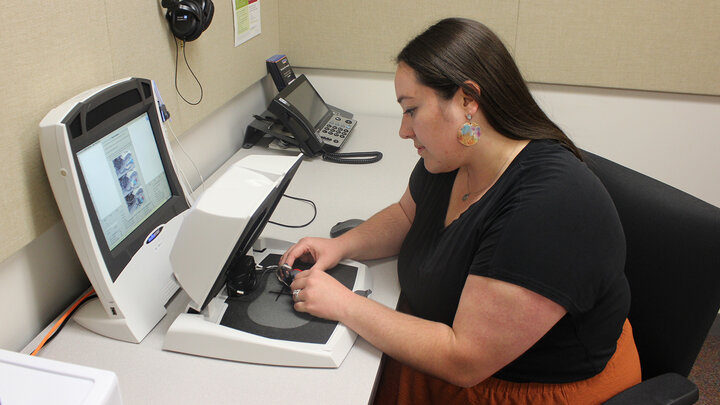Since 2011, the University of Nebraska-Lincoln’s Barkley Memorial Center on East Campus has been home to the state’s three Nebraska Hearing Aid Banks, providing access to hearing technology for low- to middle-income individuals of all ages across the state.
The Nebraska Hearing Aid Banks not only benefit Nebraskans across the state who receive hearing aids through the program, they also provide a unique opportunity for students in the Clinical Doctorate in Audiology (Au.D.) program within the College of Education and Human Sciences to take the lead in serving others while receiving the support, guidance and mentorship they need to succeed.
“I am very proud of the work our students do to serve communities across Nebraska,” said Stacie Ray, director of the Nebraska Hearing Aid Banks and professor of practice in the Department of Special Education and Communication Disorders. “This is a powerful example of how the university, working together with our community partners, can make a real and lasting difference in people’s lives.”
In addition to having at least one student serving as a graduate assistant dedicated to the Nebraska Hearing Aid Banks, the audiology program has also incorporated the banks into first-year students’ clinical rotations, providing students with the opportunity to build the skills necessary to work closely with the public, particularly underserved populations across the lifespan. They also gain experience collaborating with audiologists who work in one of the 36 partner dispensers in 16 cities across Nebraska.
“The Nebraska Hearing Aid Banks have given me the opportunity of a lifetime by working as the graduate assistant for the last 1.5 years,” said Alli Durnal, a third-year student in the Clinical Doctorate in Audiology (Au.D.) program. “My knowledge in hearing aids across manufacturers has increased exponentially, which allows me to properly troubleshoot devices and program hearing aids for my future patients. More than that, the Nebraska Hearing Aid Banks connect me with patients across the state, giving me a unique perspective on how to connect with and guide patients throughout the hearing aid process.”
Students are active participants in the entire circle of the hearing aid banks, from accepting donated hearing aids, sorting to determine which are usable, checking for repairs, reconditioning and testing to meet manufacturer specifications, to programming for each specific recipient and shipping to the partner practitioners.
“My experience in the Hearing Aid Banks helped me to become much more confident in my skills related to hearing aids,” said Elizabeth Johns, a second-year Au.D. student. “I was able to hone my hearing aid programming skills in a risk-free environment, which increased my confidence in clinical skills. Additionally, my clinical experience helped introduce me to the administrative side of audiology, and I was able to learn and practice these applications of being an audiologist.”
The Sertoma Hearing Aid Bank, which serves individuals ages 65 and older, is one of the oldest hearing aid banks in the U.S., having started in 1981 as a collaborative effort between former Barkley Speech Language and Hearing Clinic audiologist Irv Deshayes, Gateway Sertoma, the Nebraska Commission for the Deaf and Hard of Hearing.
In 2007, Ray founded HearU Nebraska, a hearing aid bank that provides new hearing aids at no cost for children birth to 18 years old. The Lions Hearing Aid Bank, which serves Nebraskans ages 19-64 years old, was brought to the Barkley Center in 2011 to round out the Nebraska Hearing Aid Banks.
Since 2020, the three hearing aid banks have provided 1,569 hearing aids to 844 individuals from 218 different cities and towns across Nebraska. In 2024 alone, Sertoma fit 141 individuals with 270 hearing aids, while HearU and Lions reached 59 individuals with 106 hearing aids.
“This collaboration not only integrates clinical teaching into real-world practice but also gives students invaluable opportunities to learn while serving others,” Ray said. “Along the way, they develop unique skills and knowledge and learn to work alongside students from other disciplines – experiences that prepare them to make a profound impact throughout their future careers.”
College of Education and Human Sciences
Special Education and Communication Disorders




